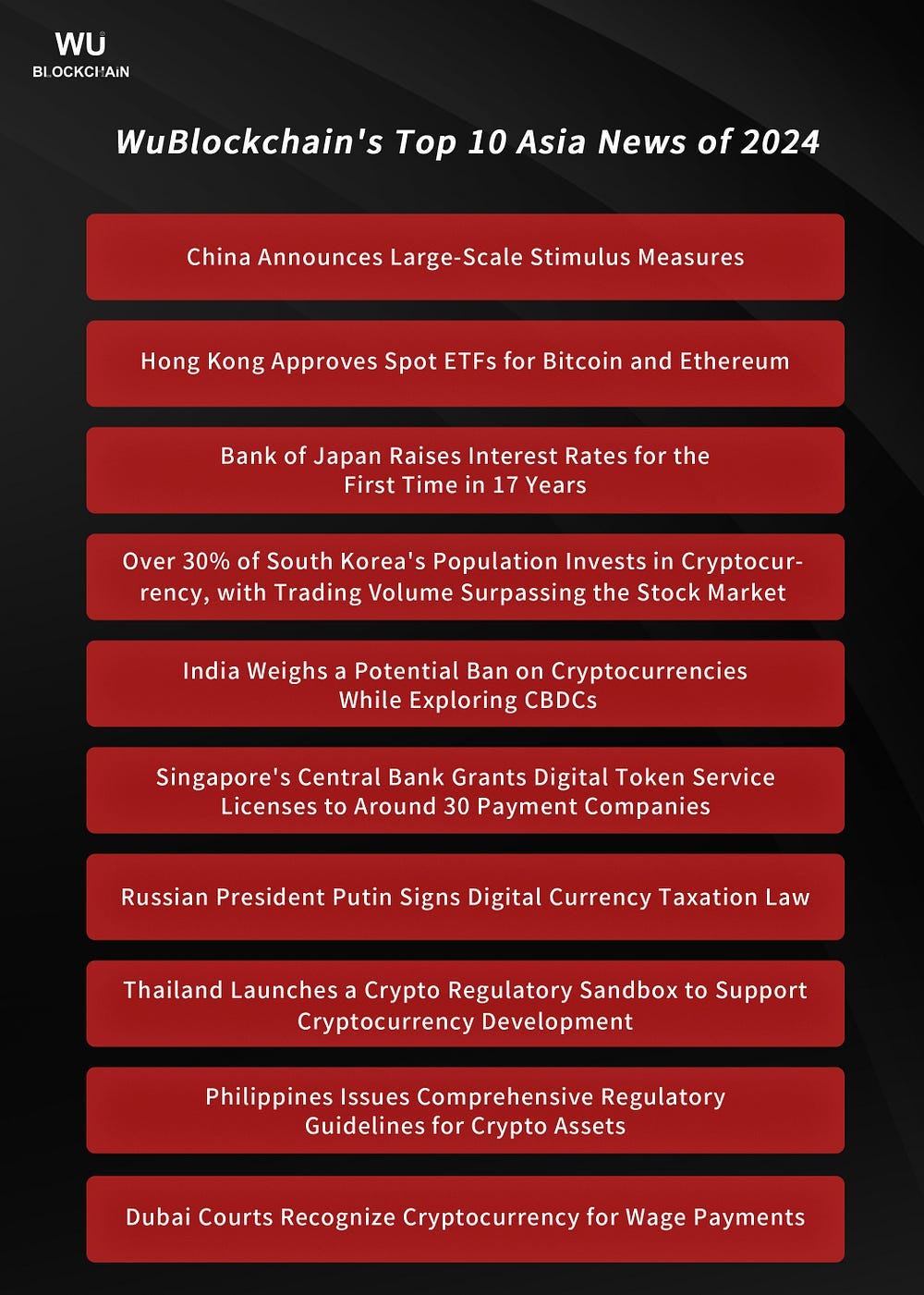WuBlockchain's Top 10 Asia News of 2024: China Launches Massive Stimulus, Hong Kong Introduces Cryptocurrency ETFs, South Korea's Crypto Trading Volume Surpasses Stock Market, and More Headlines

1. China Announces Large-Scale Stimulus Measures
In 2024, China’s central bank unveiled its largest stimulus package since the pandemic on September 24, aiming to steer the economy out of deflation and back toward the government’s growth targets. The measures included lowering borrowing costs, injecting additional funds into the economy, and reducing household mortgage burdens. Following the announcement, Chinese stock and bond markets surged, Asian equity markets reached a two-and-a-half-year high, and the yuan rose to a 16-month high against the US dollar.
On October 12, Finance Minister Lan Fo’an announced at a press briefing that the government plans to significantly increase the debt ceiling in a one-time adjustment. This move aims to restructure and replace local governments’ implicit debt and provide substantial support to mitigate regional debt risks. Once the policy undergoes the necessary legal procedures, detailed explanations will be shared publicly. This initiative represents the most robust debt-relief measure introduced in recent years, significantly easing local government burdens and freeing up resources to bolster economic growth.
The Ministry of Finance is expediting the implementation of established policies while focusing on growth stabilization, domestic demand expansion, and risk mitigation. A series of targeted incremental measures will be introduced shortly. Notably, the ministry plans to issue special government bonds to support capital replenishment for major state-owned commercial banks.
2. Hong Kong Approves Spot ETFs for Bitcoin and Ethereum
In April 2024, the Hong Kong Securities and Futures Commission (SFC) officially approved the first-ever spot Bitcoin and Ethereum exchange-traded funds (ETFs), marking a historic milestone in the region’s financial landscape. This groundbreaking move provides investors with a more transparent, secure, and efficient way to access digital asset markets, solidifying Hong Kong’s position as a leading cryptocurrency financial hub in Asia.
Issued by local financial institutions and subject to stringent regulatory oversight, these spot ETFs offer both institutional and retail investors a simplified avenue to participate in the Bitcoin and Ethereum markets. Unlike traditional cryptocurrency investment methods, spot ETFs eliminate the complexities of self-custody while reducing trading risks, thereby injecting greater liquidity and confidence into the market.
As of the latest data from SoSoValue, the total net asset value (NAV) of Hong Kong’s Bitcoin spot ETFs stands at $217 million, accounting for 0.17% of Bitcoin’s total market capitalization. Meanwhile, Ethereum spot ETFs have a combined NAV of $34.96 million, representing 0.12% of Ethereum’s market capitalization.
3. Bank of Japan Raises Interest Rates for the First Time in 17 Years link
On July 31, 2024, the Bank of Japan (BOJ) announced a significant adjustment to its monetary policy during its policy meeting, raising its benchmark interest rate, the “unsecured overnight call rate,” from the range of 0–0.1% to approximately 0.25%. This marks a decisive step aimed at addressing inflation and stabilizing the economic outlook.
BOJ Governor Kazuo Ueda stated that the possibility of additional rate hikes this year would depend on economic data, emphasizing that further adjustments would be made if inflation trends align with the central bank’s projections. This move signals a shift in Japan’s traditionally ultra-loose monetary policy, reflecting efforts to adapt to evolving economic conditions.
4. Over 30% of South Korea’s Population Invests in Cryptocurrency, with Trading Volume Surpassing the Stock Market link
As of the end of November 2024, data from the Bank of Korea revealed that the total number of cryptocurrency investors in the country surpassed 15.59 million for the first time, accounting for over 30% of the national population. The total market value of crypto assets reached ₩102.6 trillion (approximately $79 billion), with the daily trading volume approaching that of the domestic stock market.
Buoyed by expectations of pro-crypto policies following Donald Trump’s election as U.S. President, Bitcoin prices surged nearly 35% in November, driving heightened investment activity in South Korea’s crypto market. The five largest cryptocurrency exchanges reported an average holding of ₩6.58 million (approximately $5,070) per investor, with 610,000 new investors added in November alone. Additionally, unused deposits held by cryptocurrency exchanges increased to ₩8.8 trillion (around $6 billion), reflecting strong market liquidity and growing investor interest.
5. India Weighs a Potential Ban on Cryptocurrencies While Exploring CBDCs link
India is currently weighing the potential ban on cryptocurrencies such as Bitcoin and Ethereum, while exploring the adoption of a Central Bank Digital Currency (CBDC). This shift in stance stems from concerns within the government about the risks posed by private cryptocurrencies. Officials are evaluating the benefits of CBDCs, believing that they can offer similar advantages to cryptocurrencies but with reduced risks. A senior official commented that CBDCs can do everything cryptocurrencies can, without the associated risks.
It’s noteworthy that India’s regulatory approach to cryptocurrencies has been marked by a series of policy reversals, reflecting the government’s evolving stance on digital assets.
6. Singapore’s Central Bank Grants Digital Token Service Licenses to Around 30 Payment Companies link
By the end of the year, approximately 30 payment companies have received digital token service licenses from the Monetary Authority of Singapore (MAS), including major players like the U.S.-based Coinbase and Ripple, as well as Hong Kong-based Futu. According to a survey earlier this year by the exchange Independent Reserve, about 40% of Singaporean investors own cryptocurrency. This demonstrates the country’s growing embrace of digital assets and its regulatory efforts to establish itself as a leading hub for cryptocurrency-related services.
7. Russian President Putin Signs Digital Currency Taxation Law link
Russian President Vladimir Putin has signed a law that imposes taxes on digital currencies, recognizing them as property and subjecting them to foreign trade payments under the EPR (Export and Import Payment) framework. Mining and the sale of digital currencies are exempt from value-added tax (VAT), as are transaction services under the EPR framework. However, mining operators are required to report their activities to tax authorities. Individuals who obtain digital currencies through mining will be taxed based on the market value of the currency at a progressive tax rate of 13%-15%. From 2025, companies involved in mining will be subject to a 25% corporate income tax. Revenue from the sale and circulation of digital currencies will also be incorporated into a unified tax base.
8. Thailand Launches a Crypto Regulatory Sandbox to Support Cryptocurrency Development link
On August 9, Thailand’s Securities and Exchange Commission (SEC) launched a digital asset regulatory sandbox aimed at promoting experimentation and the development of new digital asset services. The sandbox invites participants interested in testing digital asset-related services. Six types of digital asset services that qualify for the sandbox include: digital asset exchanges, digital asset brokers, digital asset dealers, digital asset fund managers, digital asset advisors, and digital asset custodial wallet providers.
Additionally, on December 13, Thailand’s former prime minister, and the father of the current prime minister, stated that his industry contacts believe Bitcoin could reach $850,000, and that the Thai public should learn and stay informed, which will likely influence government policies. The prime minister has instructed to initiate research and efforts to enable Bitcoin as a payment method, starting with tourist cities. The government is also considering issuing a stablecoin backed by government bonds.
9. Philippines Issues Comprehensive Regulatory Guidelines for Crypto Assets link
On December 24, the Securities and Exchange Commission (SEC) of the Philippines issued comprehensive regulations for managing crypto assets, covering disclosures, public offerings, trading, and marketing activities. According to the new guidelines, crypto asset issuers must submit disclosure documents to the SEC at least 30 days prior to any marketing or public sale. These documents must detail the provider, issuer, key Features, risks, and underlying technology of the crypto asset, with a clear statement of potential risks, including value loss and limited transferability. Crypto assets classified as securities must obtain SEC-approved registration statements before being publicly offered. Entities issuing or trading crypto assets must comply with Anti-Money Laundering (AML) laws and SEC reporting requirements. Non-compliance could result in fines, suspension, or revocation of licenses.
Previously, on December 19, the Philippine Department of Finance announced the launch of a government bond program with a minimum investment of 500 pesos (approximately $9). The initiative aims to broaden access to small and medium-sized investors through virtual asset company PDAX and fintech company GCash. The project will operate using a distributed ledger technology (DLT) registration system, running alongside the existing paperless securities registration system (NRoSS), with the goal of promoting bond investment. Currently, less than 0.5% of the population in the Philippines invests in bonds.
10. Dubai Courts Recognize Cryptocurrency for Wage Payments link
In a landmark ruling, the Dubai Court of First Instance officially recognized the legality of using cryptocurrency to pay wages in employment contracts. The case stemmed from an employee who filed a lawsuit over unpaid wages, involving 5,250 ecowatt tokens that had not been paid over a period of six months. The court, referencing Article 912 of the UAE Civil Transactions Law and Federal Decree Law №33 of 2021, affirmed the significance of cryptocurrency as a legitimate form of compensation. This decision highlights the growing recognition of digital currencies within the legal framework of the UAE.

Follow us
Twitter: https://twitter.com/WuBlockchain
Telegram: https://t.me/wublockchainenglish
Category: China News
Post by: TheBitTimes.com
Comments
Post a Comment